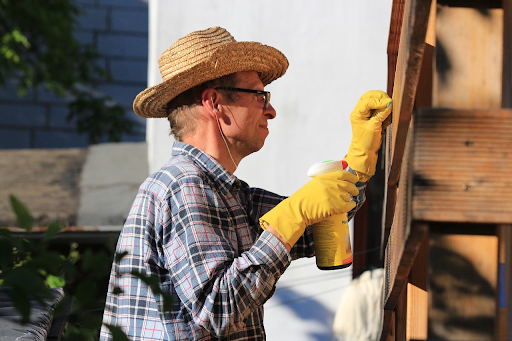
Maintaining a home is a continuous commitment that pays off in the long run through increased safety, comfort, and property value. Regular repairs and upkeep are critical for preventing minor issues from escalating into significant, costly problems. Proactive maintenance not only extends the lifespan of your home but also ensures a pleasant and functional living environment. In this blog, we will explore the importance of regular home repairs, the benefits they bring, and the essential areas that require your attention.
Key Areas for Routine Maintenance
One of the key areas for routine maintenance is the home's exterior. Regularly inspecting and repairing the roof, gutters, and siding can prevent water damage and reduce energy costs. Another critical area is the plumbing system, where addressing leaks and clogs can avert water damage and minimize mold growth. Heating and cooling systems also take a beating so doing regular water heater repair, HVAC tune-ups, and air filter replacements can help keep them running efficiently and prolong their lifespan. Additionally, it is essential to regularly check and maintain the home's foundation, windows, and doors to prevent air leaks and maintain structural integrity. This includes keeping an eye on cracks and gaps, which can lead to water intrusion and pest infestations.
Benefits of Regular Home Maintenance
Regular home maintenance is essential for numerous reasons, enhancing both the practical and financial aspects of homeownership. By regularly tending to minor repairs, homeowners can significantly reduce the potential for major issues that require costly fixes. This consistent attention not only safeguards the home's structural integrity but also enhances its overall efficiency. For instance, a well-maintained heating and cooling system operates at optimal efficiency, leading to reduced energy bills. Regular maintenance contributes to creating a safer living environment by mitigating risks such as electrical faults or water damage. It also improves comfort by ensuring that all systems, from plumbing to heating, are functioning smoothly. A maintained home holds its value better over time, making it more attractive to potential buyers should the time come to sell.
Tips for Effective Home Repair Management
Effective home repair management involves a strategic approach that prioritizes both immediate and long-term needs to ensure a well-maintained living environment. Begin by identifying potential issues through regular inspections of your property, keeping an eye out for any signs of wear or damage. Planning is essential; develop a maintenance schedule that outlines tasks based on seasonality and the specific needs of your home. Budgeting appropriately for repairs and setting aside funds for unexpected costs can alleviate financial strain. Another key aspect is staying organized by maintaining a detailed record of past and future maintenance tasks, including the professionals or services you trust for specific repairs. Being proactive rather than reactive can help prevent minor issues from escalating, ultimately protecting your investment and ensuring a safe, comfortable home.
When to Call a Professional
While many home repairs can be managed independently by capable homeowners, knowing when to call a professional can save time, and money, and ensure quality results. For complex or potentially hazardous repairs, such as electrical rewiring, gas line issues, or extensive structural damage, it's crucial to rely on licensed professionals who have the expertise and tools necessary for safe and effective repair. If a repair task involves delicate equipment, like HVAC systems, or if local building codes and permits are required, hiring a professional is advisable to avoid costly mistakes or legal complications. Additionally, projects that are beyond your skill level, consume excessive time, or require specialized knowledge should prompt a call to a trusted expert. Consulting a professional not only enhances safety but also guarantees work that is up to code and can extend the lifespan of your home components. Always evaluate the scope of the repair and prioritize the safety and durability of your home above all else.
DIY Home Repair Projects
Taking on DIY home repair projects can be a rewarding and cost-effective way to manage your property. For those keen on learning and improving their skills, numerous simple tasks can be accomplished without professional intervention. Painting walls, replacing light fixtures, and repairing small holes in drywall are excellent introductory projects that can dramatically enhance your home’s appearance. Installing shelves, assembling furniture, or weather-stripping doors and windows improve functionality and efficiency.
It is essential to research and understand the scope of each project thoroughly before beginning, ensuring you have the right tools and materials for the job. Online resources, including tutorials and guides, can provide step-by-step instructions and tips. Always prioritize safety by wearing appropriate gear and using tools correctly. With a little patience and diligence, DIY home repairs can become a satisfying part of homeownership, empowering you to maintain and personalize your living space.
The Impact of Neglecting Home Repairs
Neglecting regular home repairs can have a profound impact on your living conditions and financial situation. Small issues, if ignored, can escalate over time into costly damages that may require extensive intervention. For example, a minor leak may not seem urgent but can lead to significant water damage, mold growth, or structural issues if not addressed promptly. In addition to increased repair costs, neglect can also reduce energy efficiency, leading to higher utility bills.
Poorly maintained homes might require more work during reselling, potentially decreasing the property's market value and making it less appealing to buyers. Safety hazards like faulty wiring or weak structures pose risks that could result in accidents or injuries. Overall, failing to keep up with regular maintenance not only affects the home's longevity and efficiency but can also have broader repercussions on comfort, safety, and financial stability.
Simple Preventative Measures
Adopting simple preventative measures can significantly aid in maintaining your home’s condition and preventing larger issues. Routine checks for any signs of leaks, cracks, or other irregularities around your property can help in the early detection of potential problems. Regularly clearing gutters and downspouts prevents water overflow, which can lead to water damage. Trimming trees and shrubbery that are close to your house can prevent damage from falling branches or interference with structures. Ensuring that smoke detectors and carbon monoxide alarms are functional adds a layer of safety for your family. Seasonal maintenance, such as winterizing pipes to prevent freezing, also helps maintain the home's longevity.

Maintaining a regular schedule of home repairs and upkeep is a fundamental aspect of responsible homeownership. It not only preserves the home's structural integrity and enhances its efficiency but also contributes to the overall comfort and safety of the living environment. By being proactive, homeowners can prevent minor issues from developing into major, costly repairs, thereby ensuring the property remains an asset rather than a liability. Incorporating professional assistance when needed and embracing DIY projects where feasible can optimize the maintenance process.



(0) comments
We welcome your comments
Log In
Post a comment as Guest
Keep it Clean. Please avoid obscene, vulgar, lewd, racist or sexually-oriented language.
PLEASE TURN OFF YOUR CAPS LOCK.
Don't Threaten. Threats of harming another person will not be tolerated.
Be Truthful. Don't knowingly lie about anyone or anything.
Be Nice. No racism, sexism or any sort of -ism that is degrading to another person.
Be Proactive. Use the 'Report' link on each comment to let us know of abusive posts.
Share with Us. We'd love to hear eyewitness accounts, the history behind an article.